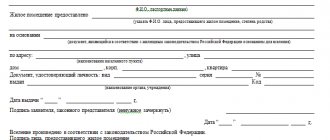Part 1 of Article 47 of the Constitution of the Russian Federation proclaims: “No one can be deprived of the right to have a case considered in the court and by the court to whose jurisdiction it is assigned by law.” This principle is most fully embodied in a comprehensive, objective consideration of the case, when the parties to the process, knowing about their procedural capabilities, make requests, including, to transfer the case to their place of residence. The appeal must be considered by the court.
The petition is officially submitted to the official or court hearing the case to take actions of a procedural nature.
In what cases is it necessary to transfer a case to your place of residence?
The judicial system of the Russian Federation is based on uniform principles, therefore there are no disagreements regarding jurisdiction between courts of general jurisdiction.
The territorial delimitation of courts of the same level is called territorial jurisdiction. Transfer of a case to territorial jurisdiction is a transfer of legal proceedings between judicial districts.
Grounds for transferring a case to the place of residence (MZ):
- the defendant's petition to transfer the case on the breastfeeding;
- petitions of the defendant and plaintiff to transfer the case to the location of the majority of the evidence;
- violation of the rules of territorial jurisdiction during legal proceedings;
- impossibility of further replacement of the court composition after challenge.
Depending on the type of legal proceedings, the grounds for transfer are regulated by Article 29.5 of the Code of Administrative Offenses of the Russian Federation, Article 33 of the Code of Civil Procedure of the Russian Federation, Article 35 of the Code of Criminal Procedure of the Russian Federation.
When a case is sent to another site, it must be accepted for consideration. The judicial system of the Russian Federation is permeated by the unity of the principles of legal proceedings: legality, competition, independence of judges and others. Disagreements among courts of general jurisdiction regarding jurisdiction are not allowed.
Violation of rules on jurisdiction as a basis for transferring a case from one arbitration court to another
An appeal from an interested person serves as a basis for initiating arbitration proceedings only if the requirements for jurisdiction established by §2 of Chapter 4 of the Arbitration Procedure Code of the Russian Federation are observed.
If the plaintiff intentionally or unknowingly violated these rules, the statement of claim and attachments are returned to him without consideration (Article 129 of the Arbitration Procedure Code of the Russian Federation). Similar rules apply to other types of requests. At the same time, the rule of paragraph 1 of Art. 39 of the Arbitration Procedure Code of the Russian Federation: disputes, the consideration of which has already begun in compliance with the rules on jurisdiction, are considered on their merits even if their jurisdiction has subsequently changed. In practice, this means the following: the plaintiff/complainant’s mistake regarding jurisdiction cannot serve as a basis for transferring the case to another court. After all, a judicial institution that was mistakenly the addressee of the claim simply should not take it into proceedings. The ruling to return the claim without consideration contains the necessary explanations and directs the plaintiff/complainant to the appropriate court. The latter accepts the claim/complaint as newly received, and not in the order of transfer of the case. Situations cannot be excluded when the plaintiff/complainant applied to the arbitration court in violation of the rules on jurisdiction, and the judge missed this fact. Then transfer of the case to another court is possible even after the opening of proceedings. Errors in matters of jurisdiction are not uncommon. This is possible, for example, when the parties entered into an agreement between themselves to change jurisdiction (Article 37 of the Arbitration Procedure Code of the Russian Federation) in violation of the rules on exclusive jurisdiction (Article 38 of the Arbitration Procedure Code of the Russian Federation), but the judge did not reveal this. If the described circumstances are identified in the procedure for considering a case by an inappropriate court, the judge initiates the transfer of the case to the institution that has jurisdiction over it in accordance with the rules on exclusive jurisdiction.
Nuances of transferring a case in criminal, civil, administrative proceedings
Criminal proceedings take place where the crime was committed, regardless of the place of registration of the person (Article 32 of the Code of Criminal Procedure of the Russian Federation). A crime that arose in one territory and was completed in another is considered according to the place of completion. Persons who are involved in the case have the right to submit requests to transfer the case on ML to a higher authority (Article 125 of the Code of Criminal Procedure of the Russian Federation).
Cases when territorial jurisdiction can be changed at the request (Article 35 of the Code of Criminal Procedure of the Russian Federation):
- when satisfying a petition to disqualify the court composition;
- if not all participants in the process live in the territory of the trial and all the accused agree to the transfer;
- if there are motivated doubts about the impartiality and objectivity of the court;
- at the request of the Prosecutor General or his deputy, if there is a threat to the safety of the participants in the case or their relatives.
The petition can be submitted before the start of the trial and is considered by a higher court within 10 days (Article 35, Part 3 of the Code of Criminal Procedure of the Russian Federation).
Civil cases, as a general rule, are heard at the location of the defendant; accordingly, requests to change territorial jurisdiction come mainly from defendants (Article 28 of the Code of Civil Procedure).
However, the plaintiff can also submit requests that entail a change in jurisdiction (Article 29 of the Code of Civil Procedure of the Russian Federation). In this case, the plaintiff himself decides where geographically it is more convenient for him to take part in the legal proceedings. The jurisdiction chosen by the plaintiff is called alternative.
The range of cases when the plaintiff can file a motion to transfer the case:
- on the protection of consumer rights;
- the defendant’s place of residence is unknown or he lives outside the Russian Federation;
- about divorce (if there are minor children or health problems);
- on the restoration of labor rights;
- on the restoration of pension and housing rights;
- on compensation for harm to health;
- about establishing paternity;
- if the location of the defendant is unknown;
- if the contract specifies the place of their execution.
When filing a petition under the Code of Civil Procedure, you must indicate the reasons why the case should be transferred to another territorial jurisdiction. For the defendant it is enough to indicate his place of residence, for the plaintiff the motive will be Art. 29 Code of Civil Procedure of the Russian Federation.
As part of administrative proceedings, petitions are regulated by Article 24.4 of the Code of Administrative Offenses of the Russian Federation, which states that the petition must be considered without delay and immediately. Immediacy means the period of proceedings.
When filing a petition during the preparation of the Protocol on an administrative offense, it can be attached to the Protocol on a separate sheet indicating this in the Protocol. Otherwise, the request may not reach the court, or it may be stated as an addition to the Protocol itself.
Commentary to Art. 39 Arbitration Procedure Code of the Russian Federation
1. In Part 1 of Art. 39 of the APC formulates a rule obliging the arbitration court to consider any case on the merits if it has accepted it for its proceedings in compliance with the rules of jurisdiction. At the same time, it is established that even if during the consideration of the case it became subject to the jurisdiction of another arbitration court (for example, the location or residence of the defendant has changed, which affects the determination of the territorial jurisdiction of the case), the arbitration court that accepted the case in compliance with the rules of jurisdiction must consider it according to essence.
Thus, when applying the commented norm, it is necessary to establish whether the rules of jurisdiction were observed at the time of initiation of proceedings in the arbitration court (at the time the claim was accepted for proceedings). If the rules of jurisdiction were violated at the time of initiation of proceedings in the case, it is necessary to apply the provisions of Part 2 of Art. 39.
When understanding the rules of jurisdiction, it is necessary to keep in mind the provisions of Art. 47 of the Constitution, according to which no one can be deprived of the right to have his case considered in the court and by the judge to whose jurisdiction it is assigned by law. Thus, the arbitrary transfer of a case from one arbitration court to another in the absence of precise grounds (circumstances) in the procedural law for which the case cannot be considered in the same court, as well as in the absence of consent of the parties, is unacceptable (see the Constitutional Court Resolution on this matter RF dated March 16, 1998 N 9-P “In the case of verifying the constitutionality of Article 44 of the Code of Criminal Procedure of the RSFSR and Article 123 of the Code of Civil Procedure of the RSFSR in connection with complaints from a number of citizens”).
2. As a general rule, an arbitration court cannot transfer a case to another arbitration court. However, there are exceptions to this rule, named in Part 2 of Art. 39 APK:
1) norm of clause 1, part 2, art. 39 of the APC is applied in the case where a claim was filed against a defendant whose location or place of residence was not previously known, as well as in the situations specified in Part 9 of Art. 38 APK. In other cases, when the case has exclusive jurisdiction, the rule of the commented norm cannot be applied;
2) norm of clause 2, part 2, art. 39 of the APC, in fact, provides for a change in jurisdiction by agreement of the parties. At the same time, clause 2, part 2, art. 39 of the APC establishes the possibility of applying an agreement concluded by the parties to change the jurisdiction of a case after the initiation of proceedings on it in an arbitration court. However, such an agreement is possible only if both parties choose the arbitration court at the location of the majority of the evidence in the case.
When applying the commented norm, it is necessary to take into account that in this case the generic jurisdiction established by Part 2 of Art. 34 of the APC, and exclusive territorial jurisdiction provided for in Art. 38 agro-industrial complex;
3) the procedural and legal consequences of failure to comply with the rules of jurisdiction of the arbitration court at the stage of initiating proceedings in the case are that the statement of claim (application) is returned to the person who filed it (clause 1, part 1, article 129 of the Arbitration Procedure Code). In the APC there are no grounds for terminating proceedings in a case or leaving a claim without consideration based on the lack of jurisdiction of the case, revealed after the initiation of proceedings on it.
If a violation of the rules of jurisdiction is revealed at the stage of judicial proceedings (the arbitration court accepted the case for its proceedings in violation of the rules of jurisdiction), then in accordance with clause 3 of Part 2 of Art. 39 of the Arbitration Procedure Code, the arbitration court transfers the case to another court that has jurisdiction over the case. For example, the parties entered into an agreement to change the exclusive jurisdiction, which the Arbitration Procedure Code does not allow, and the arbitration court, when accepting the case for its proceedings, did not discover this fact. This circumstance revealed during the consideration of the case should be the basis for transferring the case to the arbitration court that had jurisdiction over the case on the basis of the rules of exclusive jurisdiction.
Thus, the condition for the application of this rule is that the arbitration court does not have jurisdiction over the claim at the time the proceedings are initiated;
4) an example of the application of the norm of clause 4, part 2, art. 39 of the APC, there may be a dispute under a contract for the repair of premises where the arbitration court is located, the persons participating in the case in which will be the relevant contractor and the arbitration court as a legal entity. In such cases, the arbitration court, as a participant in the substantive legal relationship, by its procedural status, is a person participating in the case, in the judicial dispute and should not act as a judicial body in relation to it. Otherwise, it would be contrary to the requirements of the Constitution and the norms of international law, according to which justice must be carried out by an independent and impartial court, and would mean that one of the parties to the judicial dispute to be resolved in accordance with Part 3 of Art. 123 of the Constitution, based on the principles of competition and equality of the parties, exercises powers aimed at developing procedural relations, while the other party does not have them.
———————————
See: Determination of the Constitutional Court of the Russian Federation dated 02.03.2006 N 22-O “On the complaint of CJSC Industrial and Financial Corporation Tomich for violation of constitutional rights and freedoms, clause 4, part 2, art. 39 of the Arbitration Procedure Code of the Russian Federation.”
According to Part 2.1 of Art. 39 of the APC as provided for in clause 4, part 2, art. 39 of the Arbitration Procedure Code in a case, the arbitration court transfers the case to another determined in accordance with Part 3.1 of Art. 38 APC of the arbitration court (see commentary to Article 38 of the APC);
It should be noted that if the arbitration court, which accepted the application for its proceedings, is subsequently involved in the case as a third party, such a case is also subject to transfer to another arbitration court, determined according to the rules of Part 3.1 of Art. 38 agro-industrial complex; Clause 2 of the Resolution of the Plenum of the Supreme Arbitration Court of the Russian Federation dated April 30, 2009 N 34 “On the application by arbitration courts of Part 3.1 of Art. 38 and paragraph 4, part 2, art. 39 Arbitration Procedure Code of the Russian Federation";
5) norm clause 5, part 1, art. 39 APK. On this occasion, in Part 3 of Art. 26 of the APC provides that if, as a result of satisfying self-challenges and challenges, it is impossible to form a new composition of the court to consider the case in the same arbitration court, taking into account the rules on the inadmissibility of repeated participation of a judge in the consideration of the case, established by Art. 22 of the Arbitration Procedure Code, the case is transferred to another arbitration court of the same level. Such situations are possible in arbitration courts with a small number of judges.
Clause 5, Part 2, Art. 39 of the APC allows for other cases when it is impossible to consider a case in this court, which are grounds for transferring the case to another arbitration court. In particular, an example of the impossibility of considering a case in a given court is the case when one or another arbitration court, which has jurisdiction over the case, does not function for one reason or another.
It must be borne in mind that the transfer of the case to another arbitration court in the case specified in paragraph 5 of Part 2 of Art. 39 of the APC, must be carried out by a higher arbitration court by analogy with clause 4 of part 2 of art. 33 of the Code of Civil Procedure and in accordance with the legal position of the Constitutional Court of the Russian Federation, reflected in the Determination of 02.03.2006 N 22-O.
List of grounds for transferring the case to another arbitration court, established by Part 2 of Art. 39 of the APC is exhaustive. Transferring a case to another arbitration court on grounds not provided for in the said norm is not permitted.
In accordance with paragraph. 1 tsp. 2 tbsp. 39 of the Arbitration Procedure Code, the transfer of a case to another arbitration court must be made to an arbitration court of the same level. The formal interpretation of this provision means that the arbitration court of a constituent entity of the Russian Federation cannot transfer a case if there are those mentioned in Part 2 of Art. 39 APC circumstances in the Supreme Arbitration Court of the Russian Federation and vice versa. We are talking only about the possibility of transferring a case to an arbitration court of one level by the court that accepted the case for its proceedings.
In relation to the cases provided for in paragraphs 1, 2, 4 and 5 of Part 2 of Art. 39 of the Arbitration Procedure Code, the need to apply the rule on transferring a case only to an arbitration court of the same level is beyond doubt. However, questions arise regarding the application of this rule in the case where during the trial it turned out that the case was accepted by this arbitration court for its proceedings in violation of the rules of generic jurisdiction (clause 3, part 2, article 39 of the Arbitration Procedure Code).
So, for example, it is clear that if a case is subject to jurisdiction on the basis of Art. 38 of the APC to the Arbitration Court of Moscow, accepted for proceedings by the Arbitration Court of the Sverdlovsk Region, then the transfer of such a case with jurisdiction to the Arbitration Court of Moscow is legal on the basis of clause 3, part 2 of Art. 39 APK. However, if the Arbitration Court of the Sverdlovsk Region mistakenly accepted for its proceedings a case under jurisdiction on the basis of Part 2 of Art. 34 of the Arbitration Procedure Code of the Supreme Arbitration Court of the Russian Federation, can he transfer this case to the jurisdiction of the Supreme Arbitration Court of the Russian Federation? Based on the literal meaning of Part 2 of Art. 39 AIC cannot. Thus, a situation arises when in fact there is no mechanism for implementing the rules of generic jurisdiction: on the one hand, a case brought under the jurisdiction of the Supreme Arbitration Court of the Russian Federation cannot be considered by the arbitration court of a constituent entity of the Russian Federation, and on the other hand, since the arbitration court of a constituent entity of the Russian Federation cannot transfer such a case for consideration by the Supreme Arbitration Court of the Russian Federation, then a decision made in a case accepted by an arbitration court of a constituent entity of the Russian Federation for its proceedings in violation of the rules of generic jurisdiction cannot be canceled only on the grounds of non-compliance with the rules of jurisdiction, if in essence it is correct.
It should be noted that according to the Arbitration Procedure Code of 1995, if violations of the rules of patrimonial jurisdiction were discovered during the trial, the court of a constituent entity of the Russian Federation had the right to refer the case to the Supreme Arbitration Court of the Russian Federation, which, in particular, was confirmed by judicial practice. In addition, the provisions of the Code of Civil Procedure (Article 33) also allow for the transfer of a case to a higher court if it was decided in violation of the rules of generic jurisdiction.
———————————
See, for example: Resolution of the Presidium of the Supreme Arbitration Court of the Russian Federation dated 06/05/2001 N 3008/01.
In our opinion, the norm of clause 3, part 2, art. 39 of the APC should be applied based on the possibility of transferring a case to a higher court from a lower one and vice versa, if the case was accepted in violation of the rules of generic jurisdiction. This argument is confirmed by the explanations of the Plenum of the Supreme Arbitration Court of the Russian Federation (see paragraph 4 of the Resolution of the Plenum of the Supreme Arbitration Court of the Russian Federation dated October 12, 2006 N 54 “On some issues of jurisdiction of cases on claims for rights to real estate”).
3. In cases where the arbitration court needs to transfer the case to another court, it should not return the statement of claim and other materials to the plaintiff. The arbitration court itself refers the case to another arbitration court.
Based on the results of the arbitration court's consideration of the issue of transferring the case to another arbitration court, a ruling is issued that can be appealed to the arbitration court of appeal within ten days from the date of its issuance (Part 3 of Article 39 of the APC). A missed appeal period can be restored in accordance with Art. 117 APK. A complaint against the said ruling is considered by the arbitration court of appeal without summoning the parties within five days from the date of its receipt by the court.
The case and the ruling are sent, according to jurisdiction, to the appropriate arbitration court after the expiration of the period provided for appealing this ruling, and in the case of filing a complaint - after the adoption of a decision by the arbitration court of appeal to leave the complaint without satisfaction.
4. Part 4 art. 39 of the APC establishes a rule according to which disputes about jurisdiction between arbitration courts are not allowed. The arbitration court to which the case is sent is obliged to accept this case for consideration, even if it considers that the case was sent to it in violation of the rules on jurisdiction. Thus, from the meaning of this article it follows that the case can be transferred in accordance with Art. 39 of the APC from one arbitration court to another court only once.
How to write a petition correctly?
The petition is submitted in free written form, the result of the consideration will be a court decision on approval or refusal. The chances of satisfying the request depend on the weight of the justification for the court, on confirmation of the address of the place of stay (residence), as well as on the correctly drawn up document.
Structure of the application:
- address part. At the top right is the address, name of the judicial authority, full name of the judge, full name of the applicant, address and telephone number.
- title “Petition to transfer the case to the place of residence”, case number. Located in the middle.
- descriptive part. Here you should state the essence, motivate the reasons for the request, not forgetting to mention the right to an objective, comprehensive consideration of the case and the right to file petitions.
- pleading part (Due to the above circumstances, taking into account the address of residence, I ask you to transfer..).
- date, signatures that should be placed immediately after the text of the main part in order to avoid “additions”.
The petition is drawn up in any written form.
A sample application can be downloaded here:
What else is required to satisfy the request:
- copies of identification documents;
- a copy of the passport page with the registration stamp;
- rental agreement, social tenancy, or other document confirming permanent residence;
- certificate of registration at the place of residence;
- copies of the petition and attached documents according to the number of persons in the case.
It is important to document your residence in another jurisdiction, which gives you the right to file a petition.
Grounds for transferring a case related to the status and activities of the court
Art. 39 of the Arbitration Procedure Code of the Russian Federation establishes the grounds for the transfer of an arbitration case related to the procedural status and features of the activities of the court itself.
The idea of impartial justice and common sense is consistent with the rule that an arbitration court cannot consider a case in which it is a party.
A claim to which the arbitration court is a party is, as a general rule, submitted to the Arbitration Court of the Moscow Region. When the party to the dispute is the arbitration court of the Moscow Judicial District, the claim is sent to the arbitration court of the Tver Region (Article 38 of the Arbitration Procedure Code of the Russian Federation). According to Art. 39 of the Arbitration Procedure Code of the Russian Federation, the case is transferred to another arbitration court of the same level if it has been established that the same arbitration court is a party to the dispute. In Resolution No. 34 of April 30, 2009, the Plenum of the Supreme Arbitration Court of the Russian Federation clarified the following: third parties, as a general rule, enjoy the rights and perform the duties of a party (Articles 50, 51 of the Arbitration Procedure Code of the Russian Federation). Therefore, if the court hearing the case, after the start of the proceedings, is involved in it as a third party, the case must be transferred to another court. Another case that creates grounds for transferring a case by one court to another is the situation when, after one or several challenges, replacing judges and forming a competent court composition to consider the case is impossible. Taking into account the rules on collegial consideration of cases (Article 17 of the Arbitration Procedure Code of the Russian Federation), as well as the inadmissibility of repeated participation of one judge in the consideration of a case (Article 22 of the Arbitration Procedure Code of the Russian Federation), this is not uncommon for small arbitration courts.
Conditions for submitting an application
Any procedural action requires compliance with the requirements established by the legislator.
Who can apply?
Both the plaintiff and the defendant can file motions. The defendant has more rights in this matter; this is the traditional position of jurisprudence, known since Roman law: “the plaintiff follows the defendant.”
At the pre-trial stage, a person accused of committing an offense can file petitions.
Where to submit the application?
The request is submitted to the court in whose proceedings the case will be heard. If we are talking about a process within the framework of the Criminal Procedure Code, the appeal is sent to a higher court.
When to submit an application?
Regardless of the type of court hearing, the petition is submitted before the start of the parties' debates.
Any petition, including the transfer of the case on ML, is submitted before the start of the parties' debates at the court session.
Within the framework of the Arbitration Procedure Code of the Russian Federation, a request can be submitted from the moment when the official, accusing the commission of an offense, drew up a Protocol on the Administrative Offence.
In criminal proceedings, the type of petition discussed in the article is submitted before the start of the court hearing.
Civil proceedings provide for the possibility of filing a petition at a preliminary or first hearing.
How to submit an application?
The legislator provides for filing a petition both orally and in writing (Article 35 of the Code of Civil Procedure of the Russian Federation, Article 61 of the Code of Criminal Procedure of the Russian Federation, paragraph 3 of Article 205 of the Code of Criminal Procedure of the Russian Federation, Article 120 of the Code of Criminal Procedure of the Russian Federation). In case of refusal, the oral form will be difficult to appeal with a productive result.
The document can be submitted to the court office or through the person who drew up the Protocol on the Administrative Offence. To avoid misunderstandings in the form of a “lost” request, it is advisable to send the request by registered letter or certified telegram, keeping the correspondence stubs.
It is possible to submit via email, but the reality is that the request may be lost. In addition to the application, you need to make sure that it is included in the case materials, received by the court and satisfied. Otherwise, the trial may take place in absentia.
Payment of state There is no fee required when filing an application.
Reasons for postponing court cases
The judicial institution that accepted the case for proceedings transfers it to another instance only in exceptional cases. Such grounds for referring a case to jurisdiction are:
- change of place of residence of the defendants, while initially, when filing the claim in court, the Plaintiff and the court were not aware of this circumstance;
- the need to consider materials at the location of the disputed real estate (exclusive jurisdiction);
- violation of the rules for accepting documents for work, a judicial error, when the court did not notice when accepting the claim and scheduling a court hearing that the case should be considered in another judicial body;
- the impossibility of replacing judges in one institution (for example, when there is only one judge in the territory and there are grounds for his recusal). There may be situations where cases cannot be heard by the judges to whom they belong under the law. In this case, the chairman of the court has the right to transfer it to a court of the same level located in this region. This procedure does not contradict the Russian Constitution;
- the agreement between the parties provides for other contractual jurisdiction, which is the basis for transferring the civil case to another court;
- other reasons based on the situation of a particular case.
The procedure for sending materials to another structure is accompanied by the adoption of a determination on the direction of the case according to jurisdiction. Participants in the process may file a complaint against him.
Disputes about jurisdiction between arbitration courts
Art. 39 of the Arbitration Procedure Code of the Russian Federation establishes an imperative rule on the inadmissibility of disputes about jurisdiction. The court to which the case is sent is obliged to accept it for consideration.
This rule does not imply any exceptions.
The following are not grounds for refusal to accept a case for consideration:
- overload with tasks;
- the administration’s opinion on sending him a case in violation of the rules on jurisdiction, etc.
The rule on the inadmissibility of disputes about jurisdiction between arbitration courts corresponds to the constitutional principle of effective and timely protection of legitimate interests by the court (Article 46 of the Arbitration Procedure Code of the Russian Federation). Meanwhile, the modern version of Art. 39 of the Arbitration Procedure Code of the Russian Federation is fundamentally different from the 1992 edition. The latter allowed for the possibility of starting legal disputes about jurisdiction when transferring a case between courts. They were resolved by the Supreme Arbitration Court of the Russian Federation.









